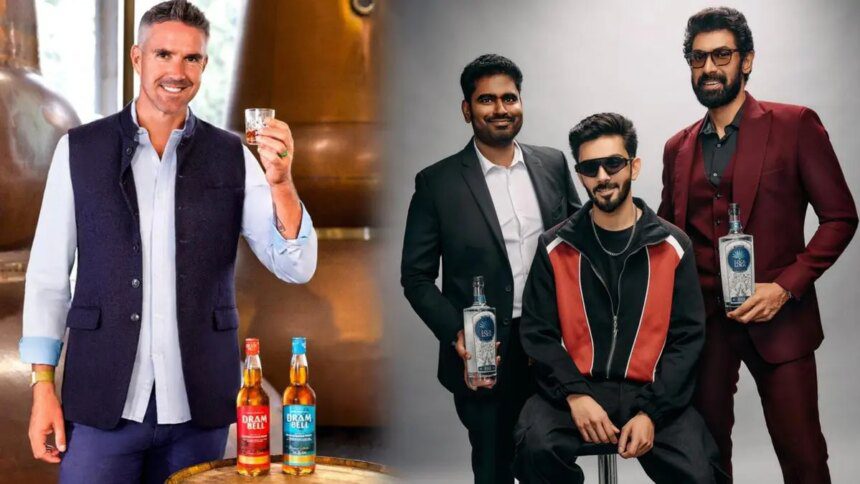India’s premium spirits market is experiencing a remarkable evolution, characterized by a surge in brands endorsed by celebrities. High-profile figures such as Rana Daggubati, Kevin Pietersen, Yuvraj Singh, Sanjay Dutt, and Danny Denzongpa are reshaping the alco-bev landscape with a unique blend of star power, artisanal craftsmanship, and strategic market positioning.
Much like Hollywood icons George Clooney with Casamigos, Dwayne ‘The Rock’ Johnson with Teremana, and Ryan Reynolds with Aviation American Gin, Indian and international celebrities are leveraging the same lifestyle branding approach to tap into India’s thriving liquor market.
Vikram Achanta, the Founder & CEO of Tulleeho and Co-Founder of 30BestBarsIndia and India Bartender Week, commented on this trend, explaining, “It’s a natural progression—celebrity-backed brands have thrived in various sectors from luxury watches to high-fashion. Given the current state of the Indian market, where premiumization and storytelling are as vital as the product itself, celebrities offer significant cultural influence. This influence is crucial in a category driven by perception.”
One example is South Indian superstar Rana Daggubati, who co-founded the tequila brand Loca Loka along with music composer Anirudh Ravichander and entrepreneur Harsha Vadlamudi. Daggubati expressed his passion for the spirits industry, stating, “I’ve always had a connection with alcobev. This feels like the right moment to join as the market is expanding, and there’s a growing demand for handcrafted, premium spirits. With more people traveling and tapping into global tastes, we aim to introduce something unique.”
He also highlighted the lucrative market potential, with projections indicating that the global tequila market could reach $15.83 billion by 2025, growing at a compound annual growth rate (CAGR) of 12.1%. Daggubati stated they had the resources, expertise, and connections to make this endeavor successful.
Daggubati oversees the brand’s creative direction—handling branding, product development, and marketing—while Vadlamudi manages daily operations, ensuring meticulous attention to detail in product creation before final approvals.
Loca Loka launched its products in international markets, including the US and Southeast Asia in 2024, and is set to enter the Indian market this October with two primary offerings: Tequila Blanco and Tequila Reposado. Recently, the brand secured $12.5 million from various undisclosed investors associated with a Singapore-based family office.
Another celebrity entering the Indian alcobev sector is former England cricket captain Kevin Pietersen, who unveiled Dram Bell, a premium blended Scotch whisky, in November last year. The brand was introduced with two variants: Dram Bell Premium and Dram Bell Reserve, aged for five years.
Having spent considerable time in India, Pietersen noticed the country’s enduring affection for whisky and its rising appetite for high-quality spirits. He remarked, “Whisky, akin to cricket, values precision, patience, and craftsmanship—principles I hold dear. The chance to offer a genuine, world-class Scotch whisky at an affordable price was one I couldn’t ignore.”
Pietersen is actively involved in shaping the brand’s strategy, marketing, and consumer engagement. He collaborates with his team to establish the brand’s narrative, ensure effective market positioning, and create consumer experiences that resonate. While he may not blend whisky in the distillery himself, he insists that each brand aspect reflects his commitment to quality and craftsmanship.
However, the Indian alcobev sector poses distinct challenges. Pietersen acknowledged that navigating the complicated and highly regulated whisky landscape, with varying licensing and pricing structures across states, is challenging. Ensuring smooth supply chains, effective branding, and consumer education is critical to adapting to India’s changing whisky scene.
For both Pietersen and Daggubati, the challenge lies in producing a product that aligns with consumer preferences. Daggubati noted that intense discussions occur during product development, asserting that once they achieve the right product, everything else falls into place— from production to market launch.
Nonetheless, celebrity status offers some competitive advantages in this industry, as Achanta pointed out. “Luxury spirits aren’t solely about visibility; credibility stems from exceptional products and lasting brand identities. Ultimately, long-term success depends on the overall consumer experience, product appeal, and how well a brand connects with its audience. The true measure of success will always be whether the spirit meets quality expectations for returning customers.”
An example of a less successful celebrity-backed brand is Copter 7, which drew inspiration from cricket star MS Dhoni and had a brief market presence.
Achanta concluded, “For a celebrity-backed brand—whether through investment or active involvement to succeed—it can’t just be surface-level. The celebrity must be fully committed and equally invested in the brand’s success alongside their partners.”










